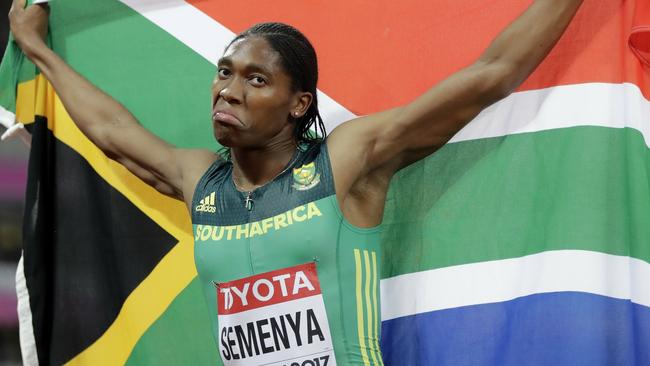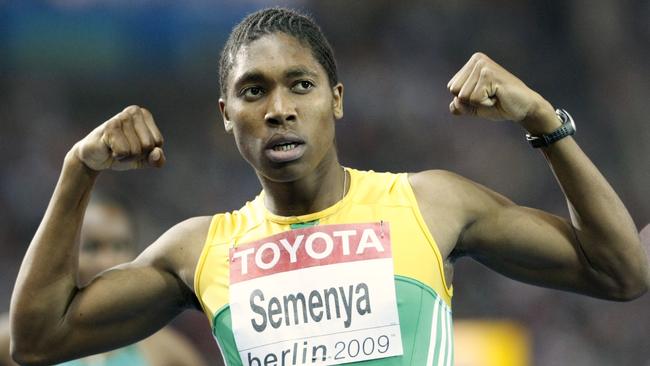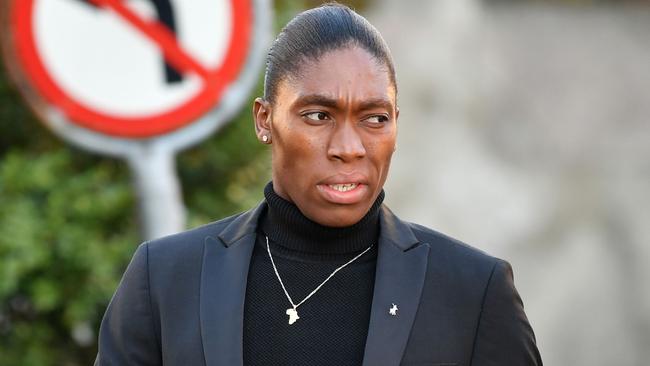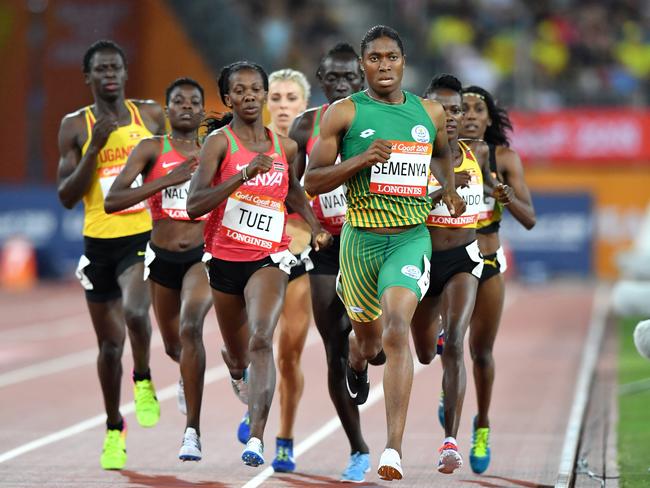Why the world is so divided over the Caster Semenya case
It’s been described as the most complex and divisive case in sporting history because it touches on so many critical issues, so here’s everything you need to know about Caster Semenya’s legal battle.
Everyone is supposed to be doing their best to rid sports of doping. Yet, in a baffling decision Wednesday, South African star Caster Semenya was ordered to take drugs if she wants to keep running for championships. Talk about sending the wrong message.
In a debate that has been raging for the better part of a decade, Semenya keeps getting singled out because her body naturally produces higher levels of testosterone than most females.
While this trait - which her lawyer describes as “a genetic gift” - undoubtedly gives Semenya an edge on the track, why is that any different than the physical advantages possessed by all elite athletes?
Julian Linden explains everything you need to know about Caster Semenya’s legal battle.

WHO IS CASTER SEMENYA?
Semenya, 28, is a South African middle-distance runner who has dominated the women’s 800 metres event for the past decade, winning two Olympic gold medals and three world titles.
WHAT’S THE ISSUE?
Her critics believe she has an unfair advantage competing against women because she has both male and female traits, caused by a rare condition known as hyperandrogenism. While her testosterone levels occur naturally, her levels are understood to be many times higher than the normal range for women, giving her extra muscle, speed and endurance.

WHEN DID THE CONTROVERSY START?
In 2009, after she won her first world title as an 18-year-old, Semenya was ordered to undergo a sex verification test after questions were raised about her appearance and her rapid improvement. Semenya was suspended for almost a year pending the outcome but allowed her to keep her gold medal. Because of privacy issues, her results were never published but in 2010 she was permitted to resume racing against women.
HOW DID SPORTING AUTHORITIES RESPOND?
In 2011, the International Association of Athletics Federations (IAAF) introduced regulations requiring athletes with hyperandrogenism to start taking medication to reduce their levels to the ‘normal’ range for women. Semenya’s times immediately slowed and her dominance ended. She finished runner-up to Russia’s Maria Savinova at the 2011 world championships and then 2012 London Olympic Games, missed the 2013 world titles because of injury and failed to make the final in 2015.
HOW DID SHE REGAIN DOMINANCE?
In 2014, an Indian teenager, Dutee Chand, successfully appealed to the Court of Arbitration for Sport (CAS) after she was indefinitely banned because of her high testosterone levels. The following year, CAS ordered the IAAF to suspend its regulations for at least two years and come up with a new procedure that would allow athletes with naturally occurring hormone levels to also compete. No longer required to take hormone reducing medication, Semenya’s times instantly improved and she raced away with the Olympic title at Rio in 2016 then the world title in 2017. She was also belatedly awarded gold medals for the 2011 world championships and 2012 Olympics after Savinova tested positive for steroids and her results were annulled.
WHY HAVE THE IAAF SUDDENLY INTRODUCED NEW REGULATIONS?
The IAAF never agreed with CAS’s ruling but in 2018, after the two year suspension on regulations had expired, the athletics body announced it was reintroducing new rules that would cap the testosterone for intersex, transgender and Difference of Sexual Development (DSD) athletes wanting to compete as females. Citing scientific research, the IAAF said the cap would be set at 5 nanomoles per litre (nmol/L), which it said was above the normal level for women (0.12-1.79 nmol/L), but below the typical level for men (7.7-29.4 nmol/L). The IAAF President Sebastian Coe told The Daily Telegraph the regulations were necessary to protect the integrity of women’s sport, saying: “The reason we have gender classifications is because if you didn’t then no woman would ever win another title or another medal or break another record in our sport.”
WHAT WERE SPORTING AUTHORITIES REALLY WORRIED ABOUT?
The big fear was that if there wasn’t a line drawn in the sand, the system would be exploited, forcing women to compete against men on a regular basis because the traditional gender categories for male and female would no longer work. Those fears were heightened when U.S. high schools began permitting athletes who were born male but identified as female to compete as girls without limitations, and they began to dominate age group events. Further evidence also emerged of countries actively looking for youths with the same rare condition as Semenya to boost medal counts, promoting the IAAF to take action.

WHAT ABOUT SEMENYA’S INDIVIDUAL RIGHTS?
One thing is clear, Semenya has done nothing wrong. She was born a woman, raised as a woman and always competed as a woman. She’s a national hero in South Africa and her government is backing her all the way, while her lawyers contend that her “genetic gift should be celebrated, not discriminated against.”
No-one is more impacted by the new regulations than Semenya, so she immediately appealed to CAS to have the rules overturned, arguing they are racist, sexist and the notion of being forced to medicate to reduce naturally occurring hormones was a violation of her human rights.
WHAT DID THE COURT DECIDE?
Described by CAS as the most “pivotal” case it has ever decided because it touched on a wide range of issues from women’s rights, to fair play, gender, ethics, science and discrimination, whichever verdict was reached was always going to be contentious.
The three judges who heard the case took months to reach their decision, and even then, they were split, with the final vote going 2-1 in favour of the IAAF.
The panel agreed with Semenya that the regulations were discriminatory against her, but ultimately siding with the IAAF’s stance that it was for the greater good.
“The majority of the Panel found that, on the basis of the evidence submitted by the parties, such discrimination is a necessary, reasonable and proportionate means of achieving the IAAF’s aim of preserving the integrity of female athletics in the Restricted Events,” CAS said.
WHAT HAPPENS NEXT?
Semenya can appeal but as things stand right now, she cannot compete as a woman, at least in her preferred 800m event, unless she lowers her testosterone levels. She can compete at other distances and recently won the 5,000m at the South African national championships, which could be a sign of her intentions. The next major international meet, where the new regulations will be in force, are the world championships, to be held in Doha later this year.

WHAT ABOUT OTHER SPORTS?
They have all been following the case very closely but keeping their lips sealed until the decision was announced. As the first one through the wall, the IAAF got a bloody nose but it won’t be long before other international sporting bodies start announcing their own regulations. The biggest, and most significant of them all, will be the International Olympic Committee (IOC), which is understood to have been preparing to announce the introduction of testosterone limits in time for next year’s Tokyo Olympics.
WHAT HAS THE REACTION BEEN?
The response to the decision has been enormous because it’s a global issues that has touched so many people, not just athletes, but governments, human rights organisations, lawyers, scientists and even pop stars, with opinions deeply divided.
THE COURT OF ARBITRATION FOR SPORT
“The Panel has not found the issues in this case easy to decide. It is clear from the range of expert evidence presented on behalf of the parties that there are many scientific, ethical and regulatory issues on which reasonable and informed minds may legitimately differ.”
THE IAAF
“The IAAF … is pleased that the regulations were found to be a necessary, reasonable and proportionate means of achieving the IAAF’s legitimate aim of preserving the integrity of female athletics in the restricted events.”
CASTER SEMENYA
“I know that the IAAF’s regulations have always targeted me specifically. For a decade the IAAF has tried to slow me down, but this has actually made me stronger. The decision of the CAS will not hold me back. I will once again rise above and continue to inspire young women and athletes in South Africa and around the world.”
SOUTH AFRICAN SPORTS MINISTER TOKOZILE XASA
“Naturally we are disappointed with the judgment. We will study the judgment‚ consider it and determine a way forward. As the South African government we have always maintained that these regulations trample on the human rights and dignity of Caster Semenya and other women athletes.”
HUMAN RIGHTS WATCH
“Women with intersex variations have the same right to dignity and control over their bodies as other women, and it’s deeply disappointing to see CAS uphold regulations that run afoul of international human rights standards.”
PAULA RADCLIFFE, MARATHON WORLD RECORD HOLDER
“I understand how hard a decision this was for CAS and respect them for ruling that women’s sport needs rules to protect it.”
BILLY JEAN KING
“I am disappointed by today’s decision by the Court of Arbitration for Sports, which will prevent Caster Semenya from competing as her authentic self. @caster800m I stand with you.”
MARTINA NAVRATILOVA
"The verdict against Semenya is dreadfully unfair to her and wrong in principle. She has done nothing wrong and it is awful that she will now have to take drugs to be able to compete. General rules should not be made from exceptional cases, and the question of transgender athletes remains unresolved."
EUROPEAN ATHLETICS ASSOCIATION
“I welcome the decision taken by CAS today which ensures governing bodies can continue to protect the female category. This was never about individuals, it’s about the principle of fair play and a level playing field for women and girls.”


